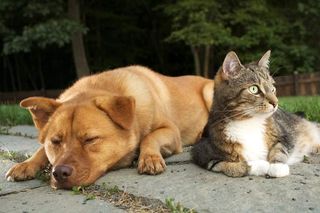Does Daylight Savings Time Affect Wild Animals?
Are Pets Affected By Daylight Saving Time?

Yous might think it unlikely that the switch to daylight saving time (DST) could throw your cat or dog'due south decorated schedule — swallow, sleep, eat, sleep — off-kilter. Just, every bit it turns out, some animals are so in tune with their owners' schedules that the one-hour spring forwards can cause some confusion.
Just like humans, animals take internal clocks that tell them when to eat, sleep and wake up. This biological timekeeper, also known equally circadian rhythm, is prepare in movement past natural sunlight. However, for pets this event is minimized past the artificial environment they live in, where light comes on not with the rising sun only with the flip of a switch.
Humans set their pets' routines, said Alison Holdhus-Small, a research assistant at CSIRO Livestock Industries, an Australia-based research and development organization.
"Animals that alive with humans develop routines related to act — for example, cows get accepted to being milked at particular times of solar day, or pet dogs become accustomed to going for walks or being fed at a detail time of day," Holdhus-Small told Life's Piddling Mysteries. "When humans apply daylight saving time to their ain lives, if they deport out their routine co-ordinate to the clock, the animals tin can become dislocated." [Why Do We Notice Daylight Saving Time?]
Holdhus-Small gives some examples of how animals might respond to a time change: If a farm possessor arrives an 60 minutes later on (when the clocks are turned back) to milk the cows, they will be waiting, bellowing because their internal routine tells them that they're late. Conversely, if the farmer arrives an hour before (when the clocks are turned alee) the cows will not be inclined to come in to milk until closer to the "proper" time.
"When humans change the clocks for daylight saving, to suit our preferred working environment, from an animal's point of view, we are suddenly behaving oddly," Holdhus-Modest said. "To the animals, information technology is inexplicable that suddenly dinner is an hour later or earlier than expected."
This behavior shift could cause animals psychological and physiological stress, Holdhus-Minor said. A cow's udder, for instance, will continue to produce milk regardless of DST and pressure will build upwards until the cow is milked. Household pets might become grumpy when they prove upwardly to an empty food dish at their perceived dinner fourth dimension.
So when yous fix your clock forward an 60 minutes this weekend, remember that your pets need a little hand-property during the time alter. Holdhus-Small-scale suggests gradually changing the animal's activities past a few minutes a day rather than the whole hr at once.
This article was provided past Life's Little Mysteries, a sister site to LiveScience.com
Source: https://www.livescience.com/13166-pets-affected-daylight-saving-time.html
Posted by: hunsuckermilitaidele1997.blogspot.com

0 Response to "Does Daylight Savings Time Affect Wild Animals?"
Post a Comment